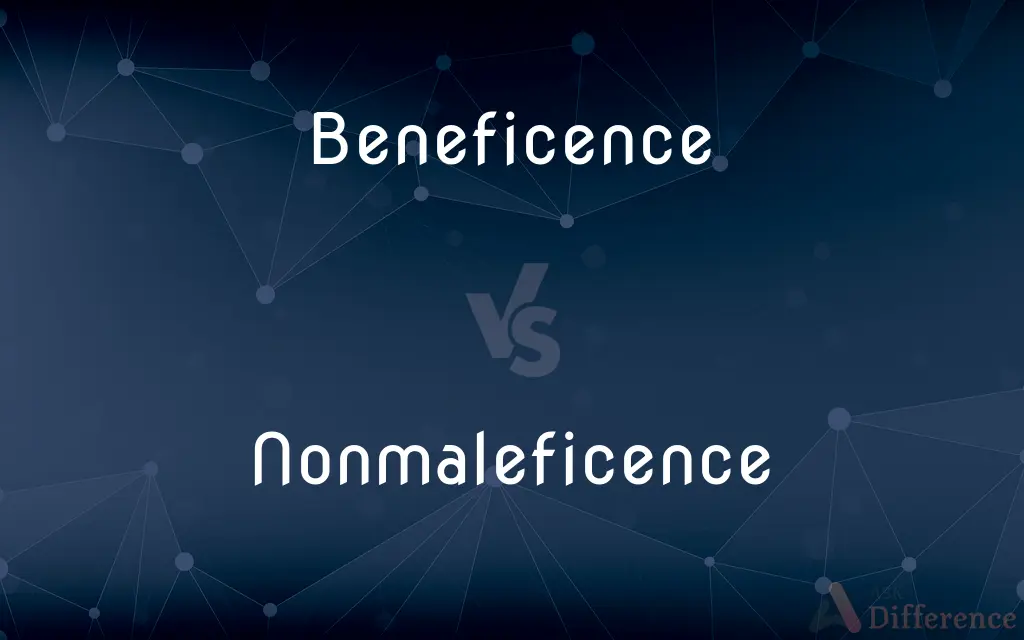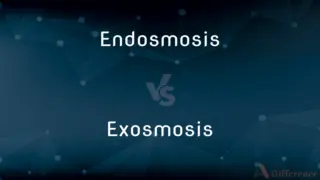Beneficence vs. Nonmaleficence — What's the Difference?
Edited by Tayyaba Rehman — By Fiza Rafique — Updated on September 22, 2023
Beneficence refers to actions that promote the well-being of others. Nonmaleficence means avoiding causing harm. The former is about doing good, while the latter is about preventing harm.

Difference Between Beneficence and Nonmaleficence
Table of Contents
ADVERTISEMENT
Key Differences
Beneficence focuses on actively improving the well-being of individuals or communities. Nonmaleficence, however, is centered on not causing harm or suffering to others. These terms are often used in ethical and medical contexts.
Beneficence often goes beyond basic duties to actively improve a situation. Nonmaleficence, in contrast, involves a more passive approach, with the emphasis being on not making a situation worse by causing harm.
Both beneficence and nonmaleficence are crucial in ethical practices, particularly in medicine. While beneficence might entail administering medication to improve health, nonmaleficence means avoiding treatments that could be harmful.
Beneficence requires a more proactive approach, often involving a comprehensive understanding of what will genuinely benefit someone else. Nonmaleficence is often simpler in concept but can be complex in practice, requiring careful consideration to avoid causing unintentional harm.
Beneficence implies a positive action to help others. Nonmaleficence is more of a cautionary principle, often guiding what not to do in order to avoid harm.
ADVERTISEMENT
Comparison Chart
Focus
Promoting well-being
Avoiding harm
Nature
Proactive
Passive or cautionary
Ethical Importance
Doing good
Doing no harm
Complexity
Often complex
Relatively simpler
Application
Medicine, ethics, social work
Primarily medicine and ethics
Compare with Definitions
Beneficence
Promoting well-being.
The doctor's beneficence was apparent in his treatment plans.
Nonmaleficence
Principle of avoiding harm.
The doctor followed nonmaleficence by not prescribing risky medications.
Beneficence
Beyond basic duties.
His beneficence extended beyond what was expected of him.
Nonmaleficence
Passive in nature.
The rule of nonmaleficence means do no harm.
Beneficence
Positive intervention.
The beneficence of the scholarship changed many lives.
Nonmaleficence
Essential in medicine.
Nonmaleficence is foundational in medical ethics.
Beneficence
Act of doing good.
Her beneficence towards the needy was commendable.
Nonmaleficence
Ethical restraint.
Nonmaleficence is key in responsible research.
Beneficence
Ethical principle.
Beneficence is crucial in medical ethics.
Nonmaleficence
Cautionary principle.
Nonmaleficence guides what not to do in medical procedures.
Beneficence
The state or quality of being kind, charitable, or beneficial.
Nonmaleficence
A lack or absence of maleficence.
Beneficence
A charitable act or gift.
Beneficence
An act of philanthropy, a kind deed; an act which benefits someone else.
Beneficence
Good or charitable character or behavior.
Beneficence
The practice of doing good; active goodness, kindness, or charity; bounty springing from purity and goodness.
And whose beneficence no charge exhausts.
Beneficence
Doing good; feeling beneficent
Beneficence
The quality of being kind or helpful or generous
Common Curiosities
Is beneficence about doing good?
Yes, beneficence involves actions that promote well-being.
Can you practice both simultaneously?
Yes, both can be practiced in ethical and medical contexts.
Is beneficence an active principle?
Yes, it generally requires proactive actions to benefit others.
Which is more complex, beneficence or nonmaleficence?
Beneficence is often more complex as it may involve multiple factors to ensure well-being.
Is nonmaleficence always about physical harm?
No, it can also involve emotional or psychological harm.
Can beneficence be mandated by law?
Generally, it's an ethical rather than a legal requirement.
Is nonmaleficence a passive principle?
Generally, yes; it often involves avoiding actions that could cause harm.
Are both principles important in medicine?
Absolutely, both are foundational to medical ethics.
Is nonmaleficence the same as beneficence?
No, nonmaleficence focuses on avoiding harm rather than actively doing good.
Is nonmaleficence a legal requirement?
In some contexts, such as medicine, it is legally mandated.
Can beneficence apply to inanimate objects?
Generally no, as it usually applies to actions that benefit living beings.
Can beneficence be risky?
Sometimes; good intentions can lead to unintended negative outcomes.
Do both terms have roots in philosophy?
Yes, both have been discussed extensively in ethical philosophy.
Does nonmaleficence mean never taking risks?
No, but it implies thoroughly evaluating risks to avoid causing harm.
Is beneficence altruistic?
Often yes, as it is concerned with the well-being of others.
Share Your Discovery

Previous Comparison
Psychology vs. Sociology
Next Comparison
Endosmosis vs. ExosmosisAuthor Spotlight
Written by
Fiza RafiqueFiza Rafique is a skilled content writer at AskDifference.com, where she meticulously refines and enhances written pieces. Drawing from her vast editorial expertise, Fiza ensures clarity, accuracy, and precision in every article. Passionate about language, she continually seeks to elevate the quality of content for readers worldwide.
Edited by
Tayyaba RehmanTayyaba Rehman is a distinguished writer, currently serving as a primary contributor to askdifference.com. As a researcher in semantics and etymology, Tayyaba's passion for the complexity of languages and their distinctions has found a perfect home on the platform. Tayyaba delves into the intricacies of language, distinguishing between commonly confused words and phrases, thereby providing clarity for readers worldwide.
















































